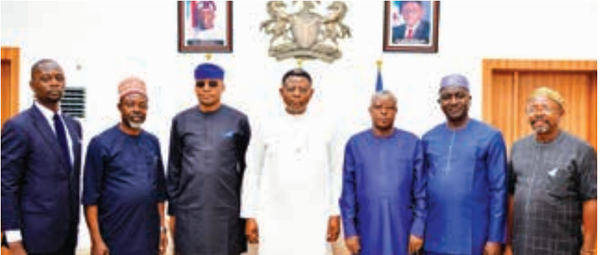Spotlight on the Banking & Finance Sector
CENTRAL BANK
In the financial services subsector, the year 2024 started with controversy. The Central Bank of Nigeria (CBN) announced that it would be relocating some of its departments from Abuja to Lagos. This soon became a national discourse on the political correctness of such a decision. The CBN argued that departments like the banking supervision unit should be moved to Lagos, to effectively discharge their duties as most of the banks have their head offices in Lagos, and the CBN, which was pressed for office space in Abuja, had unutilized properties in Lagos.
Then came the big bang. On January 10, 2024, the Central Bank of Nigeria (CBN) sacked the entire Board of Directors of Polaris, Union, and Keystone Banks, accusing them of regulatory infractions, poor corporate governance structure, questionable insider loans/deals, and poor credit management. This move was necessary to prevent the erosion of trust in the banking system and in line with the CBN’s role of regulating the sector and ensuring healthy financial institutions. In March, the CBN turned the searchlight on itself and commenced a re-organization exercise which by the end of May would see over 300 staff of the apex bank laid off. This mass sack also affected 14 of its directors in the greatest purge ever carried out by the CBN.
These were fallout from preliminary reports by Mr. Jim Obazee, the special investigator appointed by President Tinubu to review and audit the affairs of the apex bank. Appointed on July 28, 2023, Mr. Obazee, a thoroughbred professional and former head of the Financial Reporting Council of Nigeria, submitted his final report to the President on April 5, 2024. While the public is earnestly awaiting the findings of the report, the Economic and Financial Crimes Commission, (EFCC) has already secured forfeiture orders from a Federal High Court on $4. 7 Million, N830 Million, and several choice properties in Lagos and Abuja, valued at N11 Billion, all traced to Mr. Emefiele. Mr. Godwin Emefiele, the former CBN Governor, is facing a 26-count charge of corruption, fraud, and abuse of office.
Mr. Emefiele is widely regarded in financial circles as exhibiting gross incompetence in managing the apex bank of Africa’s largest economy. One commentator says he turned the CBN from a professional regulatory institution to the Central Bazaar of Nigeria, where sleaze and high-grade corruption were the order of the day, abandoning the bank’s key role of managing the monetary policies of the country, This is the Augean stable the current governor, Mr. Yemi Cardoso inherited and is trying to clean and sanitize.
TAMING INFLATION
On February 27, 2024, the CBN raised the Monetary Policy Rate (MPR) from 18.75% to 22.75%. This was further raised to 24.75% on March 26, 2024, and 26.25% on May 21, 2024. This set a 20-year record for the MPR. The MPR is the baseline interest rate upon which commercial banks set their lending rates. Thus, with a high MPR, Cash Reserve Ratio at 45%, and Liquidity Ratio at 30%, access to bank loans would be more difficult and expensive, thus discouraging borrowing. The CBN uses the interest rate as a monetary tool to fight inflation which is currently about 35% headline or total inflation, while food inflation is 41 % as of May 2024. The efficacy of these policies shall be seen in the coming months.
HERITAGE BITES THE DUST!
Heritage Bank, which was founded by the acquisition of Enterprise Bank by Societe Generale Bank of Nigeria (SGBN) in 2013. SGBN had been liquidated by the CBN as they failed to meet the then N25 Billion recapitalization requirement in 2005. However, on appeal, in 2008, a Federal High Court ordered the CBN to restore the bank’s operating licence. So, in 2023, they bought Enterprise Bank and commenced business under the name of Heritage Bank.
From then, it had been going from a rock to a hard place for the bank, until the final death knell sounded on June 3, 2024. Bad loans portfolio, unsound business practices, negative shareholder’s funds, have been attributed as reasons for the liquidation of the bank.
DOUSING THE FLAMES OF INSOLVENCY RUMOURS
Following the collapse of Heritage Bank, the CBN has been trying to douse the flames of insolvency rumours being spread about the financial health of other smaller banks, especially those rescued and given a lifeline by the past CBN Governor, Godwin Emefiele, howbeit, in controversial circumstances. There are indications of many depositors over their funds to the first tier or FUGAZ (First Bank, United Bank for Africa, Guaranty Trust, Access and Zenith) banks.
TEST FOR NDIC
The Nigerian Deposit Insurance Corporation (NDIC) set up to insure depositors funds in the banks would take up the duty of an undertaker for the dead Heritage Bank. There has not been any bank failure since 2005, so the NDIC would be put to task of organizing a seamless, transparent, and stress-free payment exercise to the depositors. Incidentally, on May 2, 2024, the NDIC increased the maximum insurance coverage for depositors across the various categories of banks, with N5 Million being the maximum coverage payable for Deposit Money Banks customers. The NDIC may wish to draw experience from America’s Federal Deposit Insurance Corporation which normally commences payment of depositors within a few days of bank collapse. So far, no depositor has been paid, and the modalities for payment are not clear. For example, there is no clarity on payments to corporate bodies, associations, trusts, etc, and customers who did not operate accounts with another bank. Customers of Heritage Bank have been asked to go to the nearest branch of the bank and fill some forms or get information on their payments. However, the branches of the bank are closed with no one to attend to the hapless customers.
ONE TERRIBLE CRASH
On February 9, 2024, the financial community and the whole country were thrown into a rude shock following the death of Herbert Wigwe, Access Bank CEO, and one of the icons of the banking industry. He died with his wife and one of his children in a helicopter crash in California, USA, while going to attend a Super Bowl game in Las Vegas. His sudden death will continue to be a major topic in banking and business circles for many years to come.
BANK RECAPITALIZATION
In March, the CBN issued a directive for banks to shore up the share capital by March 2026, or downgrade their classification. New minimum capital requirements are as follows:
• Commercial banks with international licences – N500 Billion
• Commercial banks with national licences – N200 Billion
• Commercial banks with regional licences – N50 Billion
• Merchant banks with national licences – N50 Billion
• National non-interest banks – N20 Billion
• Regional non-interest banks – N10 Billion
There is also room for mergers and acquisitions to enable banks to meet the new capital requirement, which will enable Nigerian banks to be more competitive, robust and able to finance the proposed trillion-dollar economy. However, there is a contention between the CBN and the operators on what should constitute shareholder’s funds, as the CBN has removed retained earnings from the composition of shareholders' funds, the inclusion of which would make it easier for some banks to meet the new requirement.
First Bank – 130 Years and Waxing Stronger
Established as British Bank of West Africa in March 1894, First Bank has come a long way, 13 decades after with 42 Million customers platform (one in five Nigerians maintains an account with the bank), 23 million of them on the bank’s robust digital platforms. The bank has extended its services to other African countries with representative offices in the financial hotspots of the world. Gross earnings as at December 2023 stood at N362 Billion, the highest in the bank’s history.
CHANGE OF GUARD - ALEBIOSU TAKES THE REINS
Mr. Olusegun Alebiosu, who served as the bank’s Executive Director, Risk was confirmed as the Managing Director of the bank. Also confirmed was Mr. Ini Ebong, the erstwhile treasurer of the bank, as Deputy Managing Director. This followed the sudden resignation of the erstwhile CEO, Adesola Adeduntun. Alebiosu is well-loved by the staff who are looking forward to an improved welfare package and working conditions, which were stagnated under the former CEO. A case is being made for the contract and casual staff who comprise over 50% of the staff strength but who suffer from income/ welfare apartheid compared to their colleagues who are full members of staff. Congratulations to all the people who have contributed to the success story of Nigeria’s #1 business brand. We wish Mr. Alebiosu and his team success and hope he will leverage on the enormous goodwill the brand enjoys to reposition the bank to claim its rightful position of ‘Truly the First’ in the Nigerian banking landscape.
Enter Femi Otedola
On January 31, 2024, Femi Otedola, multibillionaire and business mogul, became the Chairman of FBN Holdings Plc, the parent company of First Bank Nigeria Limited. This happened after some months of boardroom intrigues and power play, where he emerged as the biggest shareholder, with 5.6% holdings. The sudden resignation of former First Bank CEO, Adesola Adeduntan, may not be unconnected with this development. As Otedola brings his wealth of experience on board, we expect to see a turnaround change management at First Bank and other sister companies in the group. We wish him a successful tenure.
Professor Pius Olanrewaju Takes Over at CIBN
On May 17, 2024, Professor Pius Olanrewaju was sworn in as the 23rd President and Chairman of Council of the Chartered Institute of Bankers of Nigeria. Prof. Olanrewaju, a professor of Banking Law at Babcock University, took over from Dr. Ken Opara. We wish him a successful tenure.
ATEDO PETERSIDE’S GLORIOUS EXIT FROM BANKING
One of Nigeria’s iconic bankers, Mr. Atedo Peterside has retired from banking after a 35-year stint in the industry. The founder of Investment Banking Trust Company (IBTC), which later became Stanbic-IBTC, has been one of the country’s foremost and top investment bankers who have contributed much to the development of the banking industry. We wish him a happy retirement and success in his future endeavours. The banking and finance subsector has witnessed a lot of eventful activities in the first half of the year. The second half promises to me more interesting. CBN settles down to its core function of promoting financial and monetary stability, and the banks commence their recapitalization exercise. Keep a date with us in the next edition as we analyze and dissect the developments and issues from the sub-sector.
Ekpe Ekpe,FCIB
Ekpe Ekpe, a Fellow of the Chartered Institute of Bankers, and Business/Financial Consultant writes from Calabar.
ekpe@live.com



